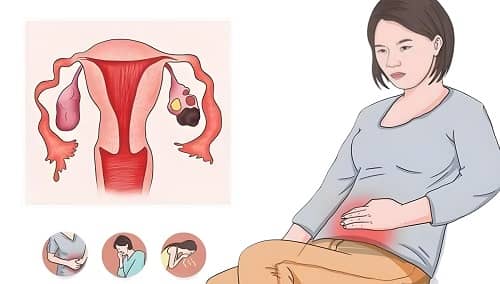Endometriosis is a common gynecological condition with a wide range of symptoms that can significantly impact a woman’s quality of life. Recognizing these symptoms early can help with timely diagnosis and effective management.

Table of Contents
- 1. Severe Menstrual Pain: More Than Ordinary Cramps
- 2. Chronic Pelvic Pain: Discomfort Beyond Menstruation
- 3. Discomfort During Intercourse: Deep Pelvic Pain
- 4. Menstrual Irregularities: Changes in Flow and Duration
- 5. Infertility: A Hidden Barrier to Conception
- 6. Bowel and Bladder Issues: Signals of Pelvic Pressure
1. Severe Menstrual Pain: More Than Ordinary Cramps
One of the hallmark symptoms of endometriosis is intense menstrual pain.
- Key Characteristics: The pain is often debilitating, far more severe than typical period cramps, and can radiate to the lower back and thighs, interfering with daily activities.
2. Chronic Pelvic Pain: Discomfort Beyond Menstruation
Endometriosis-related pain isn’t confined to menstrual cycles.
- Key Characteristics: Persistent pelvic discomfort can occur even outside of menstruation, often disrupting work, sleep, and overall well-being.
3. Discomfort During Intercourse: Deep Pelvic Pain
Many individuals with endometriosis experience pain during sexual activity.
- Key Characteristics: This deep, sharp pain is often due to inflammation or adhesions caused by endometrial tissue outside the uterus.
4. Menstrual Irregularities: Changes in Flow and Duration
Endometriosis can lead to noticeable changes in menstrual cycles.
- Key Characteristics: Symptoms may include longer or shorter cycles, heavy menstrual bleeding, and blood clots during periods. These changes are often linked to hormonal imbalances caused by endometrial growths.
5. Infertility: A Hidden Barrier to Conception
Endometriosis is a leading cause of infertility in women.
- Key Characteristics: Endometrial tissue can damage or block the fallopian tubes, interfere with ovulation, and create an unfavorable environment for conception. Studies estimate that 30%-50% of women with infertility have endometriosis.
6. Bowel and Bladder Issues: Signals of Pelvic Pressure
When endometrial tissue affects the rectum or bladder, it can result in:
- Pain during bowel movements or urination.
- Symptoms such as constipation, diarrhea, or increased frequency of urination.
- Key Reminder: These symptoms are often misattributed to digestive or urinary issues and require careful evaluation.
Conclusion
The symptoms of endometriosis can vary widely and are often mistaken for other conditions. If you experience any of these signs, it’s crucial to seek medical advice for a proper diagnosis and treatment. Taking care of your health starts with paying attention to your body’s signals.